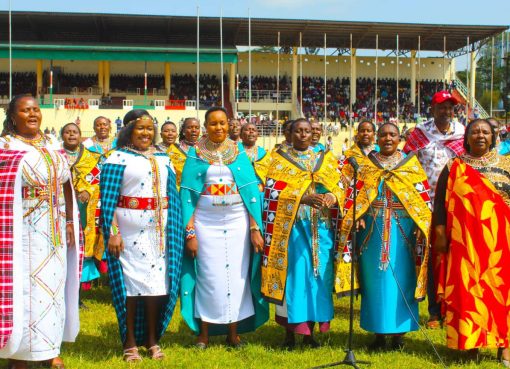Two artists, Shizo Mkenya and Justus Ngemu, have urged Kenyan media stations to prioritise local music to promote the local music industry.
The two say that by playing local music, the media stations will be creating impact in the industry and in society while also empowering local artists.
“When we go to the best practices, you will find out that, with the distribution of royalties, a big percentage goes to the international artists due to the use of international content in most of our media stations, meaning the distribution model favours the international artists over the local ones. When we urge the media to play local content, it is just to build the Kenyan music and creative industries,” said Ngemu, a popular artist who composed the song ‘Kilio kwa Mungu’.
Mkenya also urged the government to enforce the music policy that was prepared by the Permanent Presidential Music Commission (PPMC), which, among other things, requires that 60 per cent of the music played on local stations be from Kenyan artists.
“I am aware that there is a music policy through the PPMC whereby the local stations are supposed to play local content up to 60 per cent, but there is no enforcement. So we are also asking the government to enforce the law immediately before we push it to over 90 per cent,” he explained.

“An artist earns when the music is played on TV stations and radio stations. So we want local content to be given priority on our media stations so that our artists can have money,” he added.
The two artists were speaking in Kakamega during a countrywide tour to engage with artists while popularising a new Content Management Organisation (CMO) known as Content Management Services (CMS).
This follows a suspension of licenses for CMOs in the country by the Kenya Copyright Board (KECOBO) pending a court case filed at the High Court of Kenya Nairobi on March 28, 2024, that will be heard and determined on May 30, 2024, according to a press statement issued by KECOBO on May 8, 2024.
Content Management Services is one of the CMOs that has applied to be licensed by KECOBO, promising a new era for artists in the hopes that it will turn around the music industry and guarantee returns for investing in their talents.
“Collective Management Services Limited is a serious federation. The new CMO is set to bring a fresh start to the Music Industry. We want something new that will streamline the music industry because we are tired. A fresh start and a One-stop-shop CMO,” he noted.
Other CMOs that have applied for the issuance of licenses after expiry include the Music Copyright Society of Kenya (MCSK), the Kenya Association of Music Producers (KAMP), the Performing and Audiovisual Rights Society of Kenya (PAVRISK), and Film Maker Rights Achievers of Kenya Limited (FRAK).
Mkenya says Content Management Services Limited is an alternative CMO for artists that will strengthen the management team to comply with the laws of the government.
“What has been affecting these CMOs is that the leaders who are appointed to the boards have been defying government regulations and laws governing their operations, making artists suffer,” he added.
He noted that they will enforce payments of 70 per cent of royalties to artists and even more depending on the collections from music users.
“It is our number one priority that when you are there as a director, even before you come to start working, you will understand that a Kenyan artist must get 70% and even more because, in a scenario whereby, we have collected over Sh1 billion, you cannot tell me you are going to use 30% on administration; in that case, we expect that artists will get 90% and then 10% on administration,” he added.
He also said the Content Management Services Limited will create a harmonious working relationship with Music Users and the Pubs and Restaurants Association of Kenya (PERAK) to collect enough royalties for distribution to artists.
“We want to cultivate a harmonious working relationship with music users. The majority of them right now are not even paying the royalties, because of the conflict with CMOs, with others questioning why they should pay, yet the CMOs end up gobbling up the royalties meant for artists,” he added.
He said the CMS will install a proper and efficient monitoring system that will capture the statistics of the music played with the information made available to artists for reference and monitoring of how their works have performed and the money they have cashed in, in a particular time frame.
Mkenya advised artists to continue maximising on other ways of making money through their music that will increase their earnings from their talent, including Skiza Tunes sets, Live Performances, Music Distribution, and Through Endorsements.
Music is distributed through music stores like Instagram, Facebook, X, and TikTok, among others, with distribution being done by companies like Distrokid, Tunecore, and Ditto.
“Once you register with these music companies and many others, they will distribute the music for you in the music stores, and once your music goes on rotation, you will start to earn,” he explained.
Mkenya explained that endorsements are where companies approach an artist to promote their product through their music due to their popularity.
“The artist signs a contract with the company and is given an up-front amount before the start of the contract,” he added.
By Moses Wekesa and Innocent Shititah





